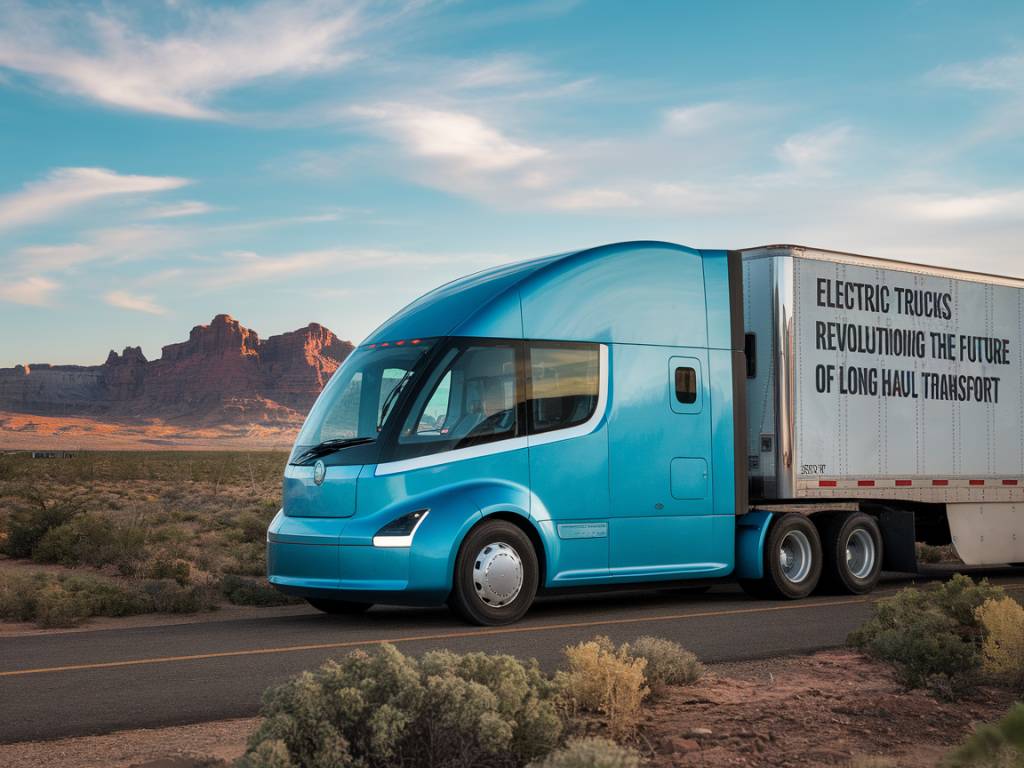In recent years, the transportation industry has been undergoing a significant transformation. One of the most impactful changes is the advent of electric trucks, which hold the potential to revolutionize the future of long-haul transport. As both environmental concerns and technological advancements push the boundaries of what’s possible, electric trucks are emerging as a sustainable, efficient, and economically viable alternative to traditional diesel-powered vehicles.
The Rise of Electric Trucks
The concept of electric trucks is not entirely new; however, recent innovations have brought them into the mainstream. Companies like Tesla, Nikola, and Rivian have made headlines with their cutting-edge electric truck models. Moreover, traditional manufacturers such as Volvo, Daimler, and Mercedes-Benz are now investing heavily in electric truck technologies.
This shift is driven by several factors, including stricter environmental regulations, advances in battery technology, and increasing fuel costs. Governments worldwide are setting ambitious targets to reduce greenhouse gas emissions, and electric trucks are poised to play a crucial role in achieving these goals.
The Technology Behind Electric Trucks
Electric trucks operate using electric motors powered by rechargeable battery packs. These batteries are typically lithium-ion, similar to those used in electric cars but significantly larger and more powerful. The motors themselves are highly efficient, converting over 90% of the electrical energy from the batteries into mechanical energy to power the vehicle.
Key technological components of electric trucks include:
- Batteries: As the heart of the electric truck, battery technology has seen remarkable advancements in energy density, longevity, and charging speed. Many electric truck models are now capable of covering 300-500 miles on a single charge.
- Electric Motors: These motors are more efficient and offer greater torque than internal combustion engines, providing superior performance, especially for heavy loads and uphill climbs.
- Regenerative Braking: This technology allows trucks to recover energy during braking, which is fed back into the batteries, enhancing overall efficiency.
- Charging Infrastructure: Development of fast-charging stations is crucial for the adoption of electric trucks. Companies and governments are working together to establish a network of charging stations along major transport routes.
Environmental Benefits
One of the most significant advantages of electric trucks is their environmental impact. Unlike traditional diesel trucks, electric trucks produce zero tailpipe emissions. This reduction in pollutants like carbon dioxide, nitrogen oxides, and particulate matter is crucial for improving air quality and combating climate change.
Furthermore, the reduction in noise pollution is another notable benefit. Electric trucks operate much quieter than their diesel counterparts, leading to less noise in urban areas and along transportation corridors.
Economic Viability
While the initial cost of electric trucks can be higher than diesel trucks, the total cost of ownership over the vehicle’s lifespan can be significantly lower. This reduction in cost is attributed to several factors:
- Lower Fuel Costs: Electricity is generally cheaper than diesel, especially when sourced from renewable energy. Electric trucks offer substantial savings in fuel costs, which can be a significant portion of operational expenses.
- Reduced Maintenance: Electric trucks have fewer moving parts compared to internal combustion engines, leading to lower maintenance and repair costs. Components such as engines, transmissions, and exhaust systems require more frequent maintenance and are prone to wear and tear than electric drive systems.
- Incentives and Subsidies: Governments are offering various incentives and subsidies to encourage the adoption of electric vehicles. These financial benefits can offset the higher upfront costs and make electric trucks a more attractive investment.
Challenges and Barriers
Despite the numerous advantages, some challenges need to be addressed for electric trucks to become the norm in long-haul transport. The following are some of these challenges:
- Range Limitations: Although battery technology is improving, range anxiety remains a concern. The distance an electric truck can travel on a single charge still lags behind that of diesel trucks.
- Charging Infrastructure: The availability of fast-charging stations along major highways is critical. The lack of infrastructure can be a significant barrier to the widespread adoption of electric trucks.
- Battery Weight and Space: Batteries are heavy and take up space, which can reduce the payload capacity of electric trucks. Advances in battery technology are essential to mitigate this issue.
- Initial Costs: The high upfront cost of electric trucks can deter some companies, particularly smaller operators, from making the switch. However, this is expected to change as production scales up and technology costs decrease.
Future Outlook
The future of long-haul transport looks promising with the integration of electric trucks. As technology continues to evolve, many of the current challenges are likely to be addressed. Innovations in battery technology, such as solid-state batteries, could significantly increase energy density and reduce charging times. Additionally, the expansion of the charging infrastructure will be pivotal in supporting the growth of electric trucks.
Collaboration among different stakeholders, including manufacturers, governments, and logistics companies, will be essential in driving this transition. Policies that favor electric trucks, investments in research and development, and public-private partnerships can accelerate their adoption and integration into the transport ecosystem.
Companies Leading the Charge
Several companies are at the forefront of the electric truck revolution. A few notable ones include:
- Tesla: Known for its advancements in electric cars, Tesla has also made significant strides in electric truck technology with their Tesla Semi, promising up to 500 miles on a single charge and featuring advanced autopilot capabilities.
- Nikola Motors: With a focus on hydrogen-electric hybrids, Nikola is working on a range of trucks that offer extended range and swift refueling times. Their collaborations with established industry players position them well for future success.
- Volvo Trucks: Volvo has been actively developing a range of electric trucks, including models specifically designed for urban and regional transport, leveraging their extensive experience in the commercial vehicle sector.
- Daimler Trucks: The global leader in commercial vehicle manufacturing, Daimler is investing heavily in electric trucks with their Freightliner eCascadia and eM2 models, aimed at various segments of the market.
- Rivian: Backed by major investors including Amazon and Ford, Rivian is working on innovative electric truck designs, focusing on rugged, all-terrain capabilities suitable for various applications.
The widespread adoption of electric trucks has the potential to significantly reshape the logistics and transportation landscape. The benefits are manifold, from environmental and economic advantages to improved public health and quieter roads. With sustained efforts from key stakeholders and continuous technological advancements, electric trucks are set to revolutionize the future of long-haul transport.



